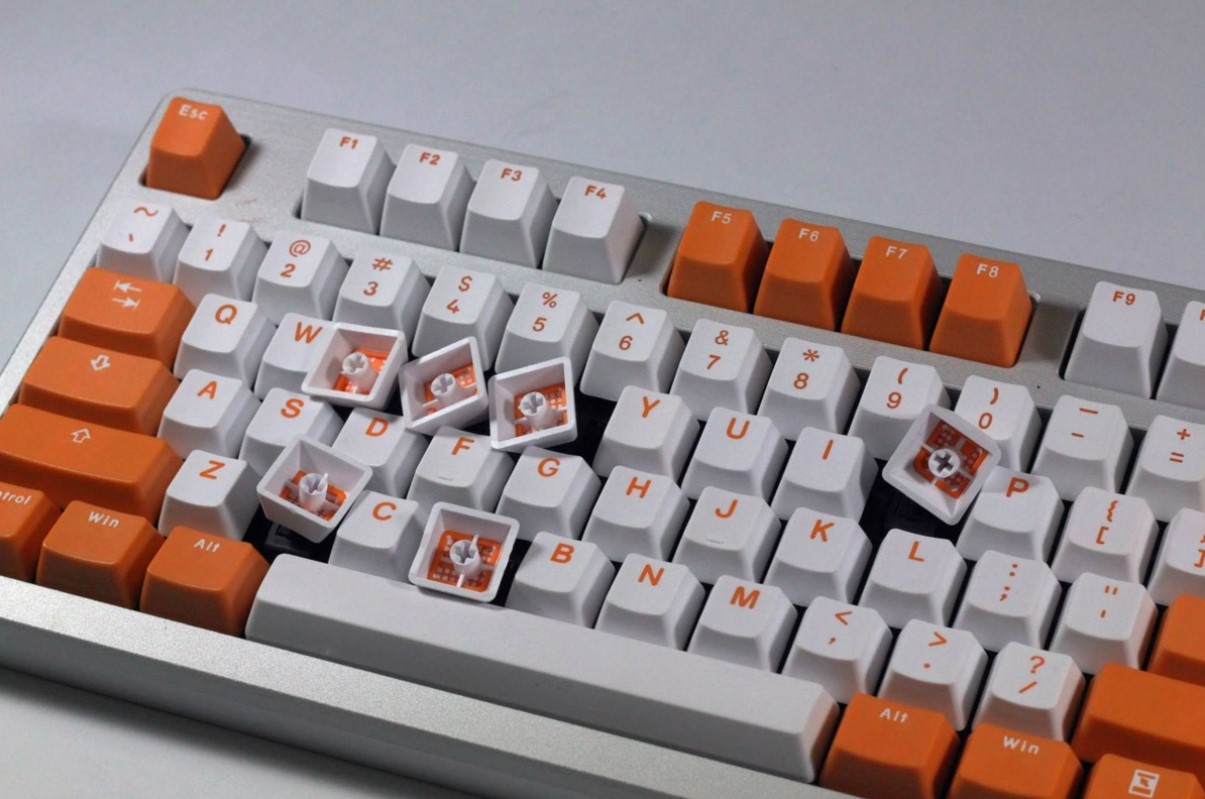Double-Shot And Dye-Sub Keycaps: Comparison
High-end keycaps are usually produced using two manufacturing techniques: double-shot anddye-sub. Could you explain what each of these methods entails and how they differ from each other?
In brief, Double-Shot and Dye-Sublimation are two methods of creating legends on keycaps. Dye-sub involves printing the legends onto the keycap, while double-shot uses injection molding to insert the legend. These processes provide excellent durability, tactile feel, and superior quality compared to other methods. To discover the significant and subtle distinctions between double-shot and dye-sub, keep reading to learn about their comparative characteristics.
>> Read more: What Are Double Shot Keycaps?

Double-Shot vs Dye-Sublimated Keycaps: Short Comparison
| Double-Shot Keycaps | Dye-Sublimated Keycaps | |
| Legends | Legends injected | Legends printed |
| Material | Uses two layers of plastic | Uses a laser, dye, and extreme heat |
| Shape | Looks sharper | May look not as sharp |
| Color of Legend | Any color legend possible | Legend must be darker than keycap |
| Color Option | Any color possible for keycaps | Fewer color options for keycaps |
| Typing | Cannot feel while typing | Cannot feel while typing |
| Durability | Will never fade or chip | Very resilient and may wear very little |
| Compatible | Used on ABS, PBT, and POM. | Only used with PBT |
| Price | Often expensive | Usually cheaper |
The Look
Regarding aesthetics, both double-shot and dye-sub keycaps produce clear and visually appealing legends. However, in some cheaper dye-sub sets, the legends may not appear as clear due to the printing process.
One limitation of dye-sub printing is that the legends must be darker than the keycap color, which restricts the available color options. This results in most dye-sub sets being lighter in color, which is a significant disadvantage of this method.
In contrast, double-shot legends can be produced in any color, making them a superior option for creating dark colored keycap sets. Manufacturers can create high-contrast and vividly colored sets using this method.
On the bottom side, dye-sub keycaps appear like regular keycaps, while the double-shot method results in additional plastic from the injected mold that creates the legend.
The Durability
Both dye-sublimated and double-shot keycaps are highly reliable.
Despite being printed on the keycaps, dye-sub is extremely durable and is the second most durable method after double-shot. Through a heat treatment process, the legend is permanently engraved onto the keycap and will only wear down over an extended period of use when the entire top surface of the keycap wears out.
In contrast, with double-shot keycaps, the legend is made of a separate plastic piece that is injected into the keycap. As a result, there is no possibility of the legend being removed, making this the most durable method among all keycaps.
Although both methods provide excellent durability, if the ultimate goal is maximum durability, double-shot sets are the best choice.
How Much?
Double-shot keycaps are typically more expensive than dye-sub keycaps due to the complexity of the process and the greater amount of resources required.
A specific mold is required for each keycap, making double-shot production more costly. While some high-end dye-sub keycaps may cost the same as lower-end double-shot keycaps, in general, double-shot sets are pricier.
Although dye-sub is cheaper, it is not inherently inferior. In fact, it is a viable option for manufacturers of non-backlit keyboards for pre-built boards.
The dye-sublimation process was used in vintage keyboards because it was more cost-effective than double-shot, even though double-shot was available at the time.
If you prioritize high-quality, visually appealing keycaps with a wide range of color options, investing in a double-shot set is worth the extra expense.
Compatible
Double-shot keycaps are frequently used as shine-through keycaps on backlit keyboards with RGB lighting, and are often the preferred method for high-quality keycaps such as GMK due to their exceptional reliability and the fact that the legends are not tactile.
Double-shot keycaps can be made from a variety of materials, including ABS, PBT, and POM. This method is commonly used in high-end ABS keycap sets. As double-shot technology is more expensive, the process is typically found on aftermarket keycaps or higher-end pre-built keyboards such as the Drop ALT or CTRL.
Dye-sublimation is a process that is used exclusively on non-backlit PBT keycaps. This method is often used on high-quality keycaps and budget-friendly alternatives to the highest quality sets from companies like GMK or Drop.
Dye-sub is also frequently used on Topre boards from companies such as Realforce, as it provides excellent quality and aesthetics without being overly expensive.
One of the reasons why vintage keyboards are recognized for their superior build quality is that many, like the IBM Model M, utilized keycaps that were manufactured using the dye-sublimation process.
In general
Both double-shot and dye-sub legends are of high quality and offer superior durability without any tactile feel. Although double-shot is generally more expensive, it provides greater color options, is compatible with materials beyond PBT, and will never wear down. Double-shot is the preferred method for high-quality backlit keycaps.
However, if you don’t require a backlit set and are satisfied with the color options provided by dye-sub keycaps, then it is worth considering this option as it offers comparable quality in terms of feel and durability.
For those who need a backlit set, require something beyond PBT, or desire a very dark or vibrant color scheme, then investing in a double-shot set is worthwhile. Otherwise, dye-sub sets are an excellent alternative and may save you money while still meeting your needs.
Visit our website https://keycapscustom.com/ to looking for the type of keycaps that fits your keyboard. Here you can also find out our newest collection of keycaps such as Artisan keycaps, Anime keycaps, Pokemon keycaps, Backlit keycaps, etc.

